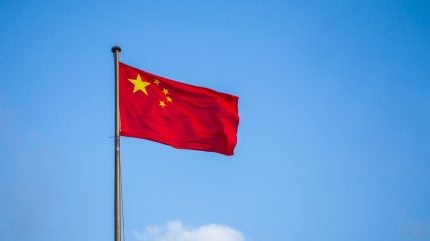
Chinese pharmaceutical companies are eyeing a lucrative commercial market set to materialise upon the patent expiry for Novo Nordisk’s blockbuster weight loss and type 2 diabetes (T2D) drug semaglutide.
While patents for the glucagon-like peptide-1 receptor agonist (GLP-1RA), known under the brand names Wegovy and Ozempic for weight loss and T2D treatment, respectively, are not set to expire until the early 2030s, protection against generics for the drug in China lapses in 2026.

Discover B2B Marketing That Performs
Combine business intelligence and editorial excellence to reach engaged professionals across 36 leading media platforms.
GlobalData pharma analyst Nadim Anwer said: “The semaglutide patent cliff in China represents a paradigm shift that will broaden access to life-changing GLP-1RA therapies while creating a new competitive landscape dominated by local players. It will drive increased competition and lower prices.”
China has emerged as a key research and development (R&D) hub in the past decade. Many big pharma companies have ventured into biotechs in the country in search of the next blockbusters in oncologic, cardiometabolic, and autoimmune indications, amongst others.
However, the gaping hole soon to be created by semaglutide’s patent expiry will offer an opportunity for Chinese biotechs to commercialise drugs in a high-growth area closer to home. The International Diabetes Federation estimates that nearly 148 million adults in China have diabetes.
Anwer added: “Chinese drugmakers face a transformative opportunity once semaglutide’s patent protection ends, positioning them to lead the future wave of diabetes and obesity treatment within China.

US Tariffs are shifting - will you react or anticipate?
Don’t let policy changes catch you off guard. Stay proactive with real-time data and expert analysis.
By GlobalData“Winning this race demands superior production capabilities, precise timing for market launch, and strong regulatory expertise. Chinese manufacturers are well-positioned to challenge established players and drive the transition in China from monopolistic pricing to more dynamic market competition.”
The pricing of GLP-1RAs has been the subject of scrutiny this year. There is a wide range of price points for Wegovy and Ozempic in the US in what has been a dynamic cost model, due to separate pressures from President Donald Trump and the compounded market. Novo’s main rival in the space, Eli Lilly, increased the price of Mounjaro (tirzepatide) in the UK in the past month to “better reflect market conditions”.
The first GLP-1RA generic was approved in the US last week when the US Food and Drug Administration (FDA) greenlit Teva’s drug referencing Novo Nordisk’s Saxenda (liraglutide). However, Saxenda is not one of the new-generation weight loss drugs and is far less popular than semaglutide and Lilly’s tirzepatide.
While it is therefore unclear as to how the Chinese market will play out, given the lack of precedent, patent losses with blockbuster drugs in other disease areas offer a clue. Generics and biosimilars can be on average 80% cheaper, meaning patients often switch away from the more expensive branded alternative.
AbbVie’s anti-inflammatory blockbuster Humira (adalimumab) used to be one of the top-selling drugs worldwide, with the drug generating $21.2bn in sales in its last year of market exclusivity in 2023. Whilst still a heavyweight in the monoclonal antibody arena, revenue is forecast to slump to $2.6bn by 2030, as per a separate analysis by GlobalData.
The drop off will likely not reach the same levels in the US, given the more consolidated pricing structure in China. Semaglutide is already significantly cheaper in China compared to the US due to its government’s price negotiation policy, with a one-month supply of the 0.25mg starter dose of Wegovy costing around 1,400 yuan ($193).
Chinese biotechs are pushing ahead with developing candidates to take advantage of the impending commercial opportunity. GlobalData states that 16 companies are developing generic versions across various clinical phases, with a slew already at Phase III. United Laboratories, Huadong Medicine, and Qilu Pharmaceutical, amongst others, have generic semaglutide assets at this final clinical phase.
Novo Nordisk is one of a raft of companies facing future headwinds from patent cliffs. MSD’s Keytruda (pembrolizumab) and Johnson & Johnson’s (J&J) Darzalex/Faspro (daratumumab and hyaluronidase-fihj) are set to lose US exclusivity by 2029, representing a particular headwind in oncology. Bristol Myers Squibb (BMS) is forecast to be one of the most impacted, with anticoagulant drug Eliquis (apixaban) and immunotherapy Opdivo (nivolumab) set to lose exclusivity.




